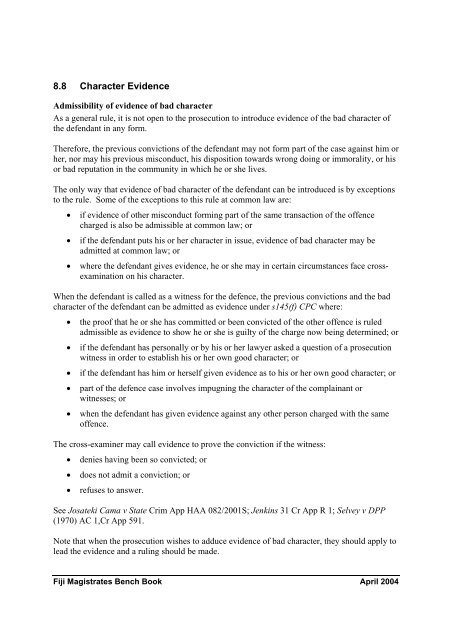Fiji Magistrates Bench Book - Federal Court of Australia
Fiji Magistrates Bench Book - Federal Court of Australia
Fiji Magistrates Bench Book - Federal Court of Australia
Create successful ePaper yourself
Turn your PDF publications into a flip-book with our unique Google optimized e-Paper software.
8.8 Character Evidence<br />
Admissibility <strong>of</strong> evidence <strong>of</strong> bad character<br />
As a general rule, it is not open to the prosecution to introduce evidence <strong>of</strong> the bad character <strong>of</strong><br />
the defendant in any form.<br />
Therefore, the previous convictions <strong>of</strong> the defendant may not form part <strong>of</strong> the case against him or<br />
her, nor may his previous misconduct, his disposition towards wrong doing or immorality, or his<br />
or bad reputation in the community in which he or she lives.<br />
The only way that evidence <strong>of</strong> bad character <strong>of</strong> the defendant can be introduced is by exceptions<br />
to the rule. Some <strong>of</strong> the exceptions to this rule at common law are:<br />
• if evidence <strong>of</strong> other misconduct forming part <strong>of</strong> the same transaction <strong>of</strong> the <strong>of</strong>fence<br />
charged is also be admissible at common law; or<br />
• if the defendant puts his or her character in issue, evidence <strong>of</strong> bad character may be<br />
admitted at common law; or<br />
• where the defendant gives evidence, he or she may in certain circumstances face crossexamination<br />
on his character.<br />
When the defendant is called as a witness for the defence, the previous convictions and the bad<br />
character <strong>of</strong> the defendant can be admitted as evidence under s145(f) CPC where:<br />
• the pro<strong>of</strong> that he or she has committed or been convicted <strong>of</strong> the other <strong>of</strong>fence is ruled<br />
admissible as evidence to show he or she is guilty <strong>of</strong> the charge now being determined; or<br />
• if the defendant has personally or by his or her lawyer asked a question <strong>of</strong> a prosecution<br />
witness in order to establish his or her own good character; or<br />
• if the defendant has him or herself given evidence as to his or her own good character; or<br />
• part <strong>of</strong> the defence case involves impugning the character <strong>of</strong> the complainant or<br />
witnesses; or<br />
• when the defendant has given evidence against any other person charged with the same<br />
<strong>of</strong>fence.<br />
The cross-examiner may call evidence to prove the conviction if the witness:<br />
• denies having been so convicted; or<br />
• does not admit a conviction; or<br />
• refuses to answer.<br />
See Josateki Cama v State Crim App HAA 082/2001S; Jenkins 31 Cr App R 1; Selvey v DPP<br />
(1970) AC 1,Cr App 591.<br />
Note that when the prosecution wishes to adduce evidence <strong>of</strong> bad character, they should apply to<br />
lead the evidence and a ruling should be made.<br />
<strong>Fiji</strong> <strong>Magistrates</strong> <strong>Bench</strong> <strong>Book</strong> April 2004
















